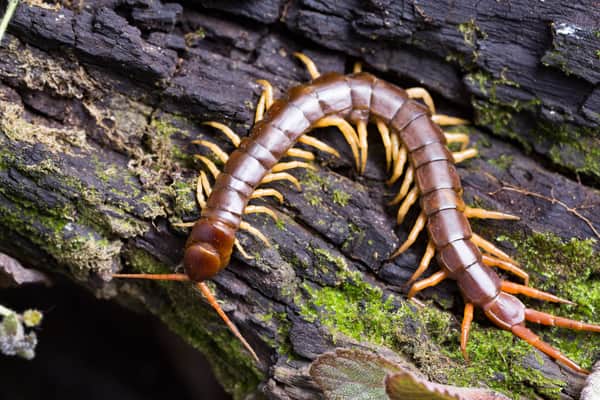Centipedes are considered one of the creepier household pests you can come across, thanks in part to their less-than-stellar looks and numerous long legs.

But are centipedes venomous? Can a centipede even bite? Learn the answers to these questions and more.
Can a Centipede Bite?
Though some people often mistakenly refer to it as “biting,” centipedes can pinch, and likely will if provoke. Additionally, some centipedes are venomous. Venom is injected through scratching from modified front legs. While their venom isn’t usually strong enough to seriously harm people, it can cause a reaction similar to a bee sting in some people.
Some centipedes can grow to be over 1 foot in length, but unless you’re trekking through the Amazon, you’re unlikely to see any longer than about 2 to 6 inches. And the larger the centipede, the more punch its pinch may pack.
Differentiating Centipedes and Millipedes
When dealing with arthropod or insect pinches or bites, it can be important to know what it is that actually pinched or bit you. Centipedes and millipedes are both arthropods with a lot of legs, so it can be hard to tell them apart. However, while centipedes can be venomous and may pinch if they feel threatened, millipedes are non-venomous and more likely to curl up into a ball or excrete a fluid.
Therefore, if you’re bitten by something and spot a millipede in the vicinity, there may be another creature responsible. On the other hand, if you see a centipede, it could very well be the culprit behind your discomfort.
Here are three more ways to discern centipedes from millipedes.
- Centipedes only have one set of legs (two legs total) per body segment, while millipedes have two sets of legs (four legs total) per body segment.
- Centipedes have long antennae. Millipedes typically have shorter antennae.
- Centipedes have longer legs, which typically allows them to move more quickly than shorter-legged millipedes.
Symptoms of a Centipede Pinch
As noted above, most humans don’t have a severe reaction to centipede bites, especially within the continental United States. It is possible, however, and centipedes can be defensive if they feel threatened, so it’s a good idea to be prepared.
Symptoms of a centipede pinch, according to the U.S National Library of Health Medicine, include:
- Pain in the area of the pinch
- Swelling in the area of the pinch
- Redness in the area of the pinch
- Lymph node swelling (rare)
- Numbness in the area of the pinch (rare)
People who are allergic to centipede venom may also have:
- Difficulty breathing
- Rapid heart rate
- Throat swelling
For information on centipede bites, visit the U.S National Library of Health Medicine. If you suspect you’ve been bitten, contact your medical professional.
How to Help Get Rid of Centipedes
If you notice centipedes in your home and want to get rid of them, or if you want to help prevent them from getting into your home in the first place, contact Terminix® and learn about a pest control plan and how it can help you.



